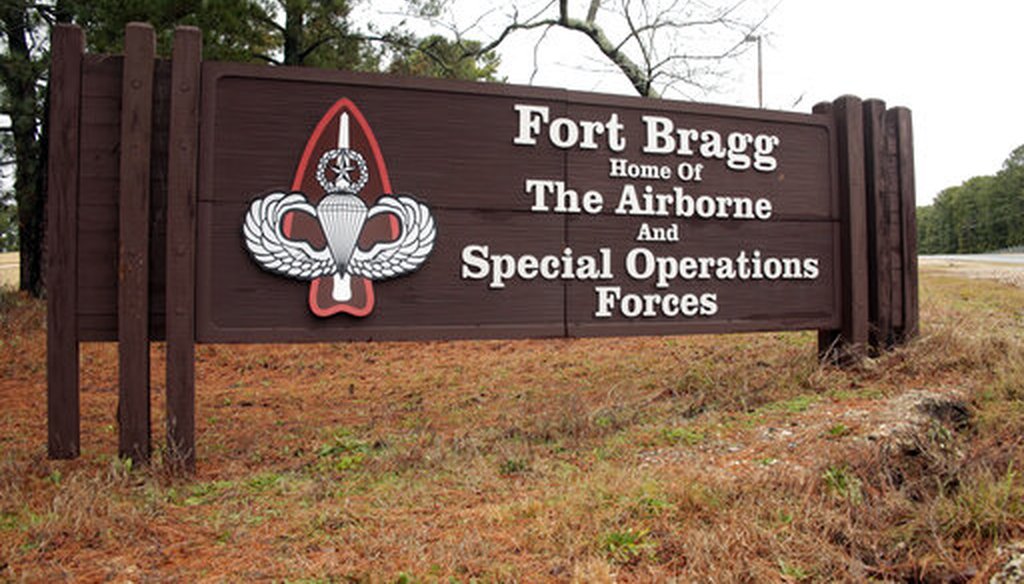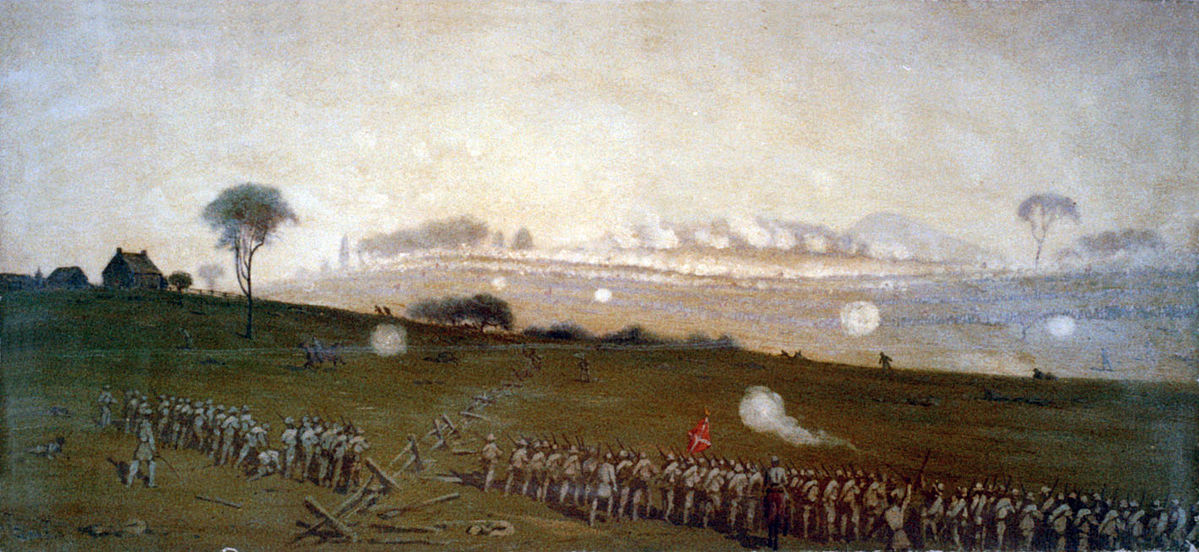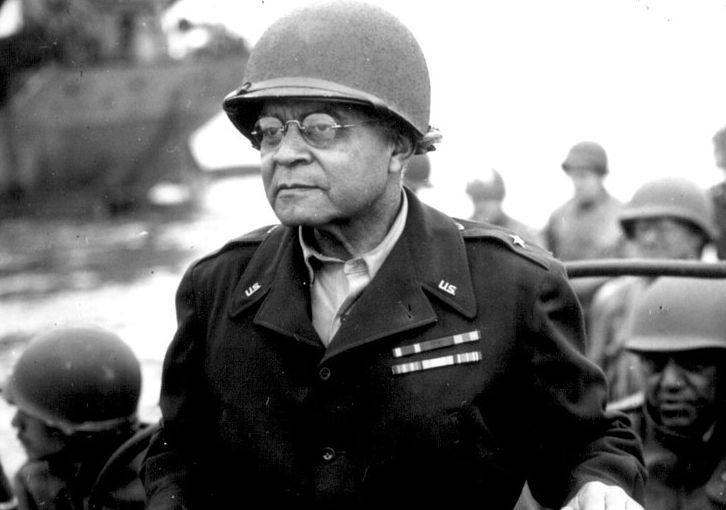Stand up for the facts!
Our only agenda is to publish the truth so you can be an informed participant in democracy.
We need your help.
I would like to contribute

A sign at Fort Bragg in North Carolina, named for a Confederate general. (AP)
If Your Time is short
• Despite President Donald Trump’s opposition, momentum is growing to rename 10 military bases that have long been named for Confederate figures.
• The bases got their names mainly during World War I and World War II, when military officials, under pressure to mobilize larger forces, erected bases in the South and yielded to local politicians’ preferences for names.
• Military historians offered a long list of potential replacement names, from top generals to African American military pioneers.
President Donald Trump may be opposed to rechristening the 10 U.S. military bases named for Confederate figures, but the idea is getting a serious look from top military brass and lawmakers
We wondered why the bases have these names in the first place, so we checked with eight military historians. The historians were unanimous that the base names should be changed, and they offered a panoply of possible honorees. (Here’s a full list of the 10 bases and their current namesakes.)
Why were these bases named for Confederate generals in the first place?
An irony is that, except for Gen. Robert E. Lee, most of these Confederate generals "were undistinguished, if not incompetent, battlefield commanders," David Petraeus, the former Army general and CIA director, wrote recently in the Atlantic.
The naming of bases after Confederates stems from both prosaic and weightier factors, historians said.
The base namings came first during World War I and then during World War II. In both cases, the military was scrambling to ramp up its forces after peacetime lulls. And at the time, the South offered the fastest path for expansion.
Sign up for PolitiFact texts
In this context, getting the political support of local politicians by choosing a name they liked "was paramount," said Lance Janda, a Cameron University historian. In the South, the military often took its cues from local and state politicians, historians said.
The timing of when these bases were named was not coincidental, historians said. It was after Union soldiers who would have opposed the names had died and before the advent of the civil rights movement, when harsh segregation was still in effect in the South.
By World War I, officials had pretty much decided that reconciliation between the North and South "was more important that the rights of freed African Americans, which led, among other things, to the unhindered establishment of Jim Crow in the South," said David Silbey, a Cornell University historian and author of "War Of Frontier And Empire."
During that period, the status quo was an "imperfect peace" that was "predicated on rewriting the narrative of the Civil War with emancipation, black participation, and black concerns edited out," said Gregory J. W. Urwin, a Temple University historian and author of "Black Flag Over Dixie: Racial Atrocities and Reprisals in the Civil War."
The military in particular was thoroughly segregated through World War II. "White Southerners filled the officer corps and the enlisted ranks, and they brought their neo-Confederate culture with them," Urwin said.
All in all, the base namings happened "during the height of the rise of America’s apartheid," said Le’Trice Donaldson, an assistant professor of social science at the University of Wisconsin-Stout and author of "Duty Beyond the Battlefield: African American Soldiers Fight for Racial Uplift, Citizenship, and Manhood, 1870-1920."
An oil painting of Maj. Gen. George E. Pickett's charge at Gettysburg, Pa., from a position on the Confederate line looking toward the Union lines. (Library of Congress)
What’s the argument for changing the bases’ names?
On the most basic level, military historians say, Confederates were disloyal.
"I do not think it morally defensible that any U.S. soldier, regardless of region, race, creed, or gender should be forced to serve on a base named for a self-proclaimed enemy of the United States who was directly responsible for killing thousands of their comrades," said Brian McAllister Linn, a Texas A&M historian and author of "The Echo of Battle: The Army’s Way of War."
Janda agreed. "I have never understood naming the bases after traitors, men who betrayed their country and bore arms against the United States," he said. "The men for whom all 10 bases were named have that in common."
On a more practical level, people of color account for a disproportionate percentage of the present-day military, so having bases named after defenders of the Confederacy, and slavery, shows a particular brand of insensitivity.
"It’s something I think white people are not as sensitive to — how much of an insult this is," said Richard Kohn, a University of North Carolina historian and author of "Military Laws of the United States, from the Civil War through the War Powers Act of 1973." "It’s time to move on."
Confederates, Silbey said, "fought to protect an utterly repugnant system that enslaved millions of Americans in the worst kind of horror. We can remember that history without honoring that history."
That said, it’s important to make changes within a context of educating service members about the reasons, Urwin said.
"A disproportionate number of service personnel are whites from the South and other rural areas of the U.S.," Urwin said. "I doubt that most of them know much about the people for whom most Army posts are named. Nevertheless, name changes should be accompanied by thorough education sessions that demonstrate the changes are consistent with current Army values."
WIthout such precautions, he said, "you could foster considerable resentment and encourage the rise of an underground neo-Confederate cult."
Brig. Gen. Benjamin O. Davis Sr. watches a Signal Corps crew erecting poles in France on Aug. 8, 1944. (National Archives)
What figures might be strong candidates for names on these bases?
The historians we checked with offered several categories of historical figures who might be candidates for renamed bases. Some of the figures below are still living, so for them, a naming might need to be posthumous.
Senior commanders
This list of top generals could include Lee’s Union rival, Ulysses S. Grant, as well as Dwight D. Eisenhower, George Marshall and George S. Patton from World War II.
George H. Thomas was a Virginian who, unlike the Confederates honored today, remained with the Union in the Civil War and became a senior commander, including leading a number of black troops at the Battle of Nashville. Robert Gould Shaw, a privileged white Bostonian, gave his life while leading a black regiment in the Civil War. (The 1989 movie "Glory" told his story.)
And John J. Pershing commanded an African American "Buffalo Soldiers" unit in the 1890s.
African American military pioneers
The patterns of base namings "certainly reflected a disregard for the historical contributions of black soldiers in the Civil War and the more immediate presence of black soldiers in the World War I and World War II military," said Chad Williams, professor of history and African and African American Studies at Brandeis University and author of "Torchbearers of Democracy: African American Soldiers in the World War I Era."
Henry Ossian Flipper and Charles Young were among the first black West Point graduates. Martin Delaney was the first black officer during the Civil War, while Christian Fleetwood was a Medal of Honor recipient during the Civil War. And Harriet Tubman served as a spy in the Union army.
Benjamin O. Davis Sr. became the first African American general in the U.S. Army in 1940, and his son Benjamin O. Davis Jr. commanded the Tuskegee Airmen, a group of African American pilots. Julius W. Becton Jr. is a three-star general who served in World War II and the Korean and Vietnam wars. Roscoe Robinson Jr. was the first African American to become a four-star Army general; he commanded the 82nd Airborne Division at Fort Bragg.
Colin Powell became the first African American to chair the Joint Chiefs of Staff after being nominated by President George H.W. Bush.
Individuals who helped desegregate the military
Matthew Ridgway headed the United Nations Command during the Korean War and took steps to implement President Harry S. Truman's 1948 executive order to integrate the armed forces.
Truman himself served as an artillery captain during World War I, which could qualify him for the honor of having a base named in his honor. Truman "was descended from Confederate veterans, but rose above that," Urwin said. "In many ways, he modeled the kind of behavior that the Army encourages."
Military pioneers who were women or members of other ethnic groups
Mary Edwards Walker was a Civil War surgeon who received the Medal of Honor. Anna Mae Hays became the first female general in the Army in 1970. Ann Dunwoody became the first four-star female general in the Army in 2008. Daniel K. Inouye, later a senator, was a Medal of Honor recipient in Italy in World War II while serving in a segregated Asian-American unit.
Tibor Rubin was a Hungarian Jew who was liberated from a concentration camp by U.S. soldiers, emigrated to the United States, joined the Army, served in Korea, and survived as a prisoner of war; he was awarded the Medal of Honor.
Enlisted personnel
Historically, bases have been named largely after generals, ignoring enlisted service members.
One longstanding proposal has been to rename Ft. Hood for Roy Benavidez, a Texan of Mexican ancestry who served in the Army special forces and who was awarded a Medal of Honor for service in the Vietnam War.
One of the most decorated soldiers of World War II was Audie Murphy, who began as an enlisted man and received a battlefield promotion to officer.
Medal of Honor recipients
In the states with bases named after Confederates, there have been 15 medal of honor recipients from Alabama, 13 from Georgia, 31 from Virginia, 12 from North Carolina, 47 from Texas, and 15 from Louisiana who served in the U.S. Army or U.S. Army Air Corps. "Any of them would be deserving," Janda said.
"Changing the names should be seen as a wonderful opportunity and not some kind of damaging revisionism," he said. "The truth is that most military bases are temporary, and a lot of them were closed or had their names changed during the last Base Realignment and Closing Commission. What we have now is a chance to have a meaningful discussion about who we honor and how and where we honor them."
------------------------------------
In the South, where the Confederacy was based, 10 bases have been named after Confederates. Some of the forts on this list are among the biggest and most important domestic bases, including Fort Benning, Fort Bragg, and Fort Hood.
• Camp Beauregard, La., named for Confederate Brig. Gen. P.G.T. Beauregard. Named during World War I.
• Fort Benning, Ga., named for Confederate Gen. Henry Lewis Benning. Named during World War I.
• Fort Bragg, N.C., named for Confederate Gen. Braxton Bragg. Named during World War I.
• Fort Gordon, Ga., named for Confederate Lt. Gen. John Brown Gordon. Named during World War II.
• Fort A.P. Hill, Va., named for Confederate Lt. Gen. Ambrose Powell Hill. Named during World War II.
• Fort Hood, Texas, named for Confederate Maj. Gen. John Hood. Named during World War II.
• Fort Lee, Va., named for Confederate Gen. Robert E. Lee. Named during World War I.
• Fort Pickett, Va., named for Confederate Maj. Gen. George E. Pickett. Named during World War II.
• Fort Polk, La., named for Confederate Lt. Gen. Leonidas Polk, who was killed in action in Georgia. Named during World War II.
Our Sources
Donald Trump, tweet, June 10, 2020
NBC News, "GOP-led committee backs renaming bases that honor Confederates, setting up clash with Trump," June 11, 2020
Washington Post, "Trump won’t rename Army posts that honor Confederates. Here’s why they’re named after traitors," June 11, 2020
New York Times, "These Are the 10 U.S. Army Installations Named for Confederates," June 11, 2020
David Petraeus, "Take the Confederate Names Off Our Army Bases," June 9, 2020
Email interview with Brian McAllister Linn, Texas A&M historian and author of "The Echo of Battle: The Army’s Way of War," June 15, 2020
Email interview with Lance Janda, Cameron University historian, June 15, 2020
Email interview with Gregory J. W. Urwin, Temple University historian and author of "Black Flag Over Dixie: Racial Atrocities and Reprisals in the Civil War," June 15, 2020
Email interview with David Silbey, Cornell University historian and author of "War Of Frontier And Empire," June 15, 2020
Email interview with Le’Trice Donaldson, assistant professor of social science at the University of Wisconsin-Stout and author of "Duty Beyond the Battlefield: African American Soldiers Fight for Racial Uplift, Citizenship, and Manhood, 1870-1920," June 15, 2020
Email interview with Chad Williams, professor of history and African and African American Studies at Brandeis University and author of "Torchbearers of Democracy: African American Soldiers in the World War I Era."
Email interview with James C. Cobb, University of Georgia historian, June 16, 2020
Interview with Richard Kohn, University of North Carolina historian and author of "Military Laws of the United States, from the Civil War through the War Powers Act of 1973," June 15, 2020












































